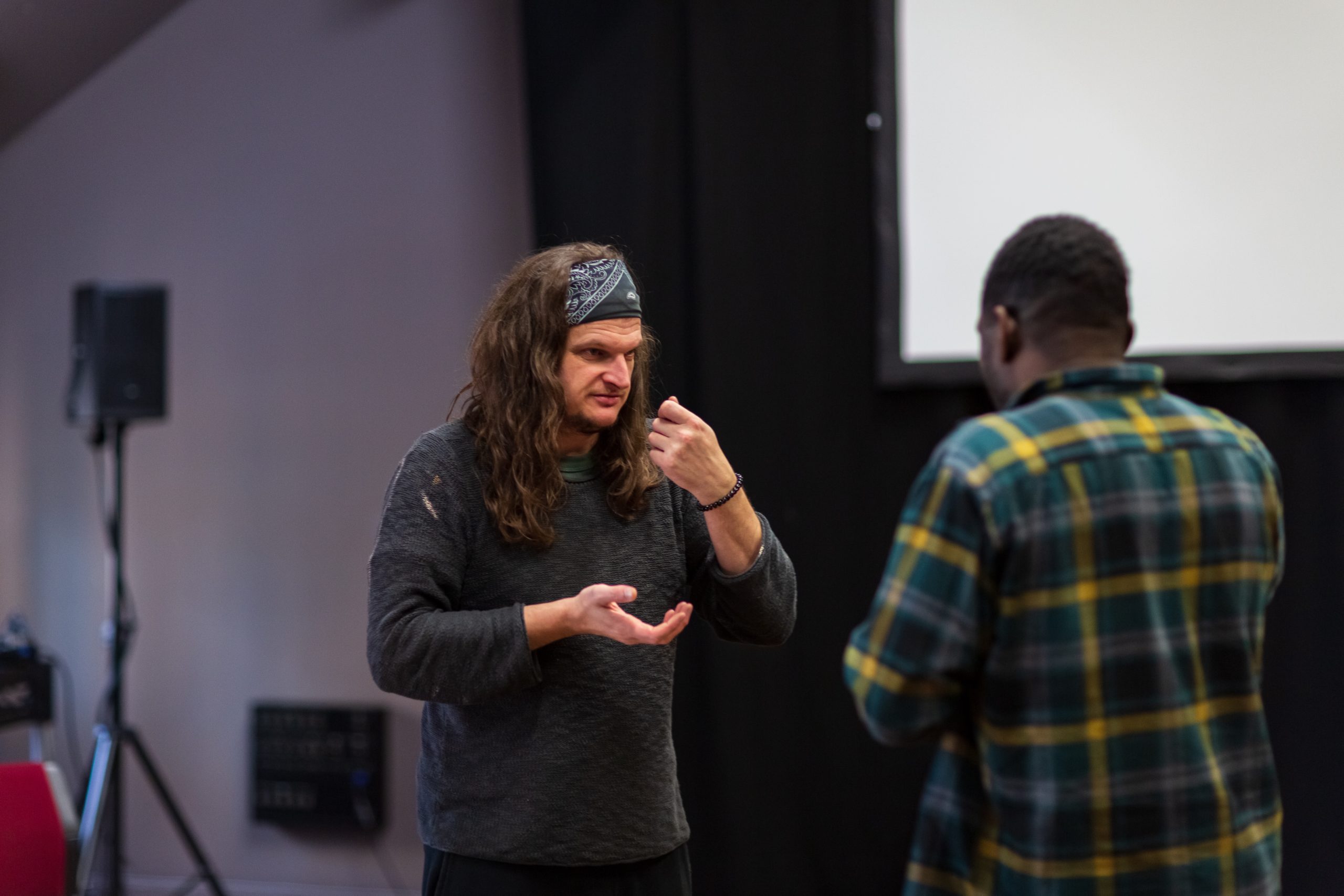In January of this year, Paul Miller stepped into a studio nestled in the upper floors of Live Theatre, ready to try something completely new.
As an artist and theatremaker who usually works in the fantasy genre, previous works (such as The Gingerbread Witch, which was also developed in collaboration with Live) have centred on written scripts, with the creative team only needing to focus on acting and directing. However, as a recipient of a Developing Your Creative Practice (DYCP) grant, a push from Arts Council England to support artists focusing on creative development and exploration, it was time to enter the unknown. The week ahead would involve collaboration, vulnerability and reflection, to develop work on deaf and disabled experiences of the pandemic.
Joining him were dancers Chris Fonseca and Raffie Julien, filmmaker and performer David Ellington, and performer Brian Duffy, who also works with visual vernacular sign language. The team hail from across the UK; after searching for local deaf artists in the North East and struggling to find anyone, the final cast was instead built from a diverse group with a range of experiences, skills and memories of 2020. Paul was clear that the entire cast had to be deaf, as this project presented a rare opportunity to bring together varying deaf artists and give them time and a safe space to examine the impact of this period on their lives.
Each performer arrived with widely varying recollections of this time. For Paul, memories of lockdown are particularly painful. His mother was categorised as high risk, leading to household shielding while his son, Alexander, lived with his mother in a different bubble. Separated by lockdowns and then only able to interact at a distance, Paul became increasingly paranoid about hygiene and saddened by his inability to interact with his son up close.
After sharing these painful memories, the cast engaged in deep discussions throughout the week of their experiences, pain, frustration and, at times, relief, that came with the pandemic period. While Paul experienced isolation, others felt crammed into their houses with their large families. And while lockdown was even more confusing for deaf people in England – due to a complete lack of BSL interpretation during lockdown announcements – some enjoyed the chance to take a break from work and relax. All of these perspectives helped the cast shape the final work, which follows a host of deaf characters as they attempt to muddle through the pandemic with no translation, navigating everything from the everyday stresses of toilet roll hoarding to the uprising of social justice movement Black Lives Matter in 2020 (three of the cast members are Black and were deeply affected by this time). Memory and narrative intermingle with clarity and heart, resulting in work that doesn’t just feel like a rehash of our worst moments in 2020. Instead, it weaves a deft narrative of community that feels relatable to a wide audience.
With no idea of how the process would develop or what discussions would lead to, the work evolved organically through collective creativity, skills and bonds within the cast. It also gave the performers a chance to reflect on the lack of accessibility and how these experiences, both global and personal, affected them all. Watching the story of being separated from his son could be so difficult it moved Paul to tears, resulting in multiple occasions where he had to leave the studio to calm down. He also eventually performed a poem he’d written about this experience, after much coaxing and encouragement from the rest of the cast. It was warmly received despite being difficult to perform, with Paul holding tears back as he read, and many audience members sharing how impactful it was.
Overall, audience feedback was overwhelmingly positive. At the end of the week a sharing was held for a mixed group, with many hearing people in attendance who hadn’t known the extent of the barriers deaf people had faced during the pandemic. Arts Council England also encouraged Paul to continue development, which he is keen to do.
In future, Paul hopes to expand the creative exploration of these ideas into further poetry and film projects, to accompany live performances with the same cast. While the core of the project would remain the same, there are also multiple barriers the group didn’t have a chance to explore, including mental health impacts, communication issues for deaf people due to doctors, hospitals, and staff wearing full PPE and masks that covered their mouths, and interpreters having to work from home. There are many more areas to touch on to expand the message, and many more ways for this group to take these stories forward. With such a wide array of experiences and talents, Paul is excited to keep sharing deaf and disabled stories to wider audiences, challenging and entertaining viewers in equal measure, and ensuring these voices continue to be heard.
